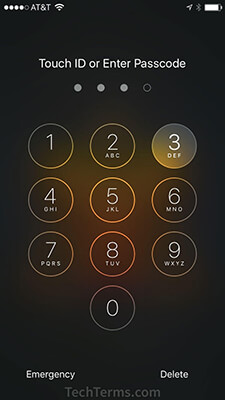Passcode
A passcode is a numeric sequence used to authenticate a user on a computer or electronic device. The word "passcode" is sometimes used synonymously with "password," but technically, a passcode only contains numbers.
The security of a numeric passcode is proportional to how many digits it contains. Since there are ten possible values for each digit (0-9), the number of possible codes is equal to ten raised to the number of digits. For example, a four-digit passcode can have 104 or 10,000 different combinations. A six-digit passcode can have 106 or 1,000,000 different combinations.
Passcodes provide quick and easy authentication on devices with a numeric keypad. Smartphones, for instance, allow you to enter a passcode as an alternative to fingerprint or face recognition. Other devices that use passcode authentication include ATMs, electronic safes, and security system control panels. When accessing an ATM, your PIN (personal identification number) may double as your passcode.
Since passcodes only contain integers, they are naturally less secure than passwords or passphrases. Therefore, devices that provide passcode authentication often disallow access after a certain number of failed login attempts. For example, if you passcode-protect your smartphone and enter the wrong passcode multiple times, you may be required to wait several minutes before you can attempt to log in again.
 Test Your Knowledge
Test Your Knowledge